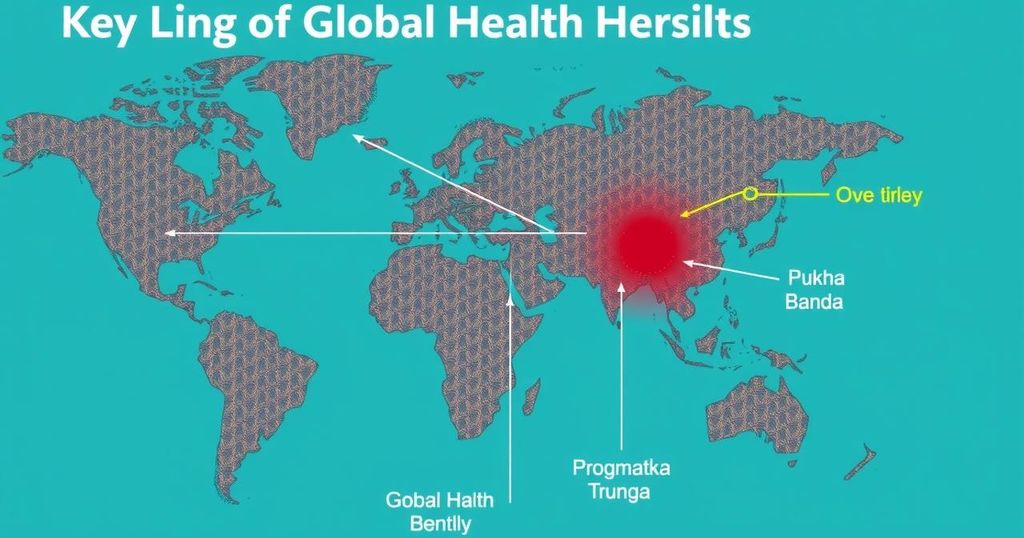World news
ASIA, CANADA, CDC, CENTRE FOR HEALTH AND HEALTHCARE, CLIMATE, CLIMATE CHANGE, DEMOCRATIC REPUBLIC OF CONGO, EUROPE, GERMANY, GLOBAL WARMING, INDIA, MPOX, NATURAL DISASTERS, NORTH AMERICA, OLIVER WYMAN, SHY, SHYAM BISHEN HEAD, SWEDEN, THAILAND, UNITED KINGDOM, UNITED STATES, WORLD ECONOMIC FORUM
Aisha Khan
0 Comments
Key Global Health Issues of 2024 and Their Implications
In 2024, several global health stories emerged, including the significant impact of climate change on health, rising communicable diseases, advancements in healthcare technology via AI, women’s health disparities, workplace wellbeing, and the ongoing threat of antimicrobial resistance. These issues shaped discussions at the World Economic Forum and called for urgent actions and collaborations for improved health outcomes worldwide.
In 2024, global health issues prominently surfaced, influencing discussions and actions at prestigious platforms such as the World Economic Forum. The year’s narrative encompassed the multifaceted challenges of climate change on health, escalating communicable diseases, the advent of technological advancements in healthcare, disparities in women’s health, workplace impacts on well-being, and the pervasive threat of antimicrobial resistance (AMR). This compilation delineates the most significant health stories that shaped the year, reflecting both urgent concerns and opportunities for action.
One paramount concern was the escalating impact of climate change on public health. A comprehensive report titled Quantifying the Impact of Climate Change on Human Health, produced in conjunction with Oliver Wyman, illuminated how climate change would fundamentally alter health landscapes over the following two decades. The report warned that failing to address climate challenges could lead to an estimated 14.5 million additional deaths and significant economic detriment, stressing that vulnerable populations will suffer most. Furthermore, it highlighted urgent health risks stemming from extreme weather patterns and called for enhanced healthcare resilience strategies.
The year also witnessed alarming outbreaks of communicable diseases, notably measles, which surged by 20% globally partly due to misinformation about vaccines, resulting in 10.3 million cases reported in 2023 alone. Additionally, mpox was declared a public health emergency, as a new variant emerged, spreading internationally. Notably, dengue cases had nearly doubled since the previous year, with over 12.7 million reported between January and September 2024, underscoring the pressing nature of infectious diseases as a continuing threat.
Technological innovations, particularly in artificial intelligence (AI), garnered attention for their potential to transform healthcare delivery and efficiency. The World Economic Forum showcased several case studies demonstrating how generative AI could enhance diagnostics and patient experiences, although challenges persisted, particularly in its application in lower-income settings. The need for robust strategies and frameworks to ensure effective AI integration was emphasized to navigate existing barriers.
Women’s health emerged as a pivotal topic in 2024, with analyses revealing that despite women living longer, they often do so in poorer health compared to men. A report titled Closing the Women’s Health Gap: A $1 Trillion Opportunity to Improve Lives and Economies outlined the socio-economic implications of these health disparities and emphasized the importance of including women’s perspectives in health discussions. Ensuring equitable healthcare for women was deemed essential for societal well-being and economic robustness.
The interplay between work and health prompted significant discourse, recognizing that occupational environments considerably impact individual health outcomes. Experts highlighted the direct correlation between employee mental health and overall productivity, advocating for workplace wellness initiatives as vital for fostering healthier employees and, by extension, a more resilient economy.
Lastly, antimicrobial resistance (AMR) remained a troubling global challenge. A United Nations meeting in September 2024 focused on AMR, where Member States committed to a 10% reduction in AMR-related deaths by 2030. Reports warned of the catastrophic potential of drug-resistant infections, projecting that if unaddressed, deaths could escalate to 169 million by 2050. The global community is therefore urged to enhance access to effective antibiotics and fortify public health approaches to mitigate this critical threat.
The year 2024 was marked by a myriad of health challenges that directly impacted global discourse and policy formulation. Key issues included the consequences of climate change on health outcomes, the resurgence of communicable diseases, advancements in healthcare technology, disparities in women’s health, workplace wellness considerations, and the looming threat of antimicrobial resistance. These themes were comprehensively addressed through various reports and discussions at international platforms like the World Economic Forum, thereby underlining the need for collective action and innovative solutions to improve global health standards.
In conclusion, the health narratives of 2024 highlight an urgent call for sustained attention and action from the global community. Addressing the intertwined challenges posed by climate change, communicable diseases, technological integration in healthcare, women’s health disparities, workplace wellbeing, and antimicrobial resistance is pivotal for enhancing health outcomes worldwide. The dialogues initiated this year set a vital foundation for future collaborative efforts and innovative strategies aimed at overcoming these pressing health issues.
Original Source: www.weforum.org




Post Comment